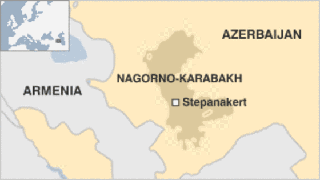In a Wednesday visit with Azeri President Aliyev, Secretary of State John Kerry pushed for an “ultimate resolution of the frozen conflict of Nagorno-Karabakh.” Within 72 hours a full-scale war had erupted in the contested region.
 Nagorno-Karabakh has a complicated history. The Karabakh Khanate became a protectorate of Russia in 1805, and the Khanate was dissolved, joining the Russian Empire in 1822. With the establishment of the Soviet Union and the creation of the Armenia and Azerbaijan SSRs, the status of Nagorno-Karabakh became contested between the two.
Nagorno-Karabakh has a complicated history. The Karabakh Khanate became a protectorate of Russia in 1805, and the Khanate was dissolved, joining the Russian Empire in 1822. With the establishment of the Soviet Union and the creation of the Armenia and Azerbaijan SSRs, the status of Nagorno-Karabakh became contested between the two.
The Soviets attempted to resolve the fighting by making Nagorno-Karabakh an autonomous oblast within Azerbaijan, though fighting continued with efforts to see the oblast transferred to Armenia. The Soviets offered increased autonomous, but the fighting just continued until the Soviet Union’s ultimate collapse.
Independent as of 1991, Armenia and Azerbaijan immediately started fighting over the region, with three years of conflict ending in a ceasefire. The 1994 ceasefire left Nagorno-Karabakh in a contested state, with an Armenian backed independent Republic established but unrecognized, and Azerbaijan still retaining its legal claims over the land.
That situation has remained largely unchanged since, though Azerbaijan has complained about Armenia’s systematic settlement of ethnic Armenians into the region in an attempt to further enhance their hold on it. This includes reports of a large chunk of Syria’s displaced Armenian minority being resettled in Nagorno-Karabakh.
Fighting resumed in earnest Friday night, with both sides accusing the other of starting it. Azerbaijan claims Armenia was shelling their villages, while Armenia claims Azerbaijan attacks out of the blue for no reason. An Azeri M-24 helicopter was shot down, and several several Armenian tanks were reported destroyed. At least 30 fighters were killed between the two sides, though some reports claimed 100 Armenian troops were killed.
By Sunday, Azerbaijan announced a unilateral ceasefire, though they did say they retain the fight to carry out retaliatory operations against any further Armenian “aggression.” So far there doesn’t seem to be additional fighting, but things are still far from normal.
A resumption of the war between Azerbaijan and Armenia could seriously threaten regional stability, as their conflicts have tended to take on a religious tone. Armenia is overwhelmingly Christian, while Azerbaijan is vast majority Shi’ite Muslim.


